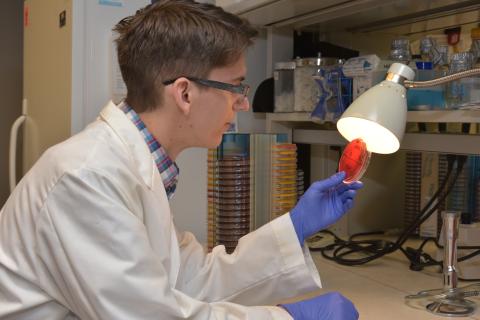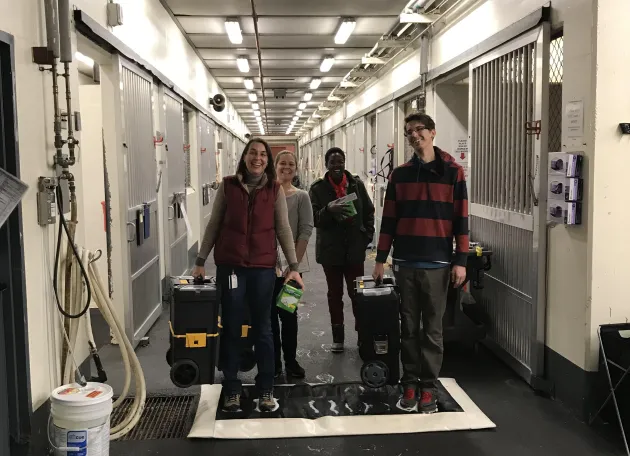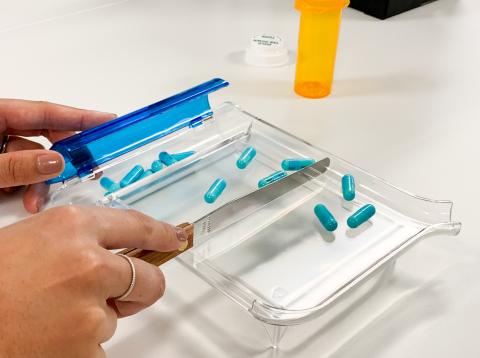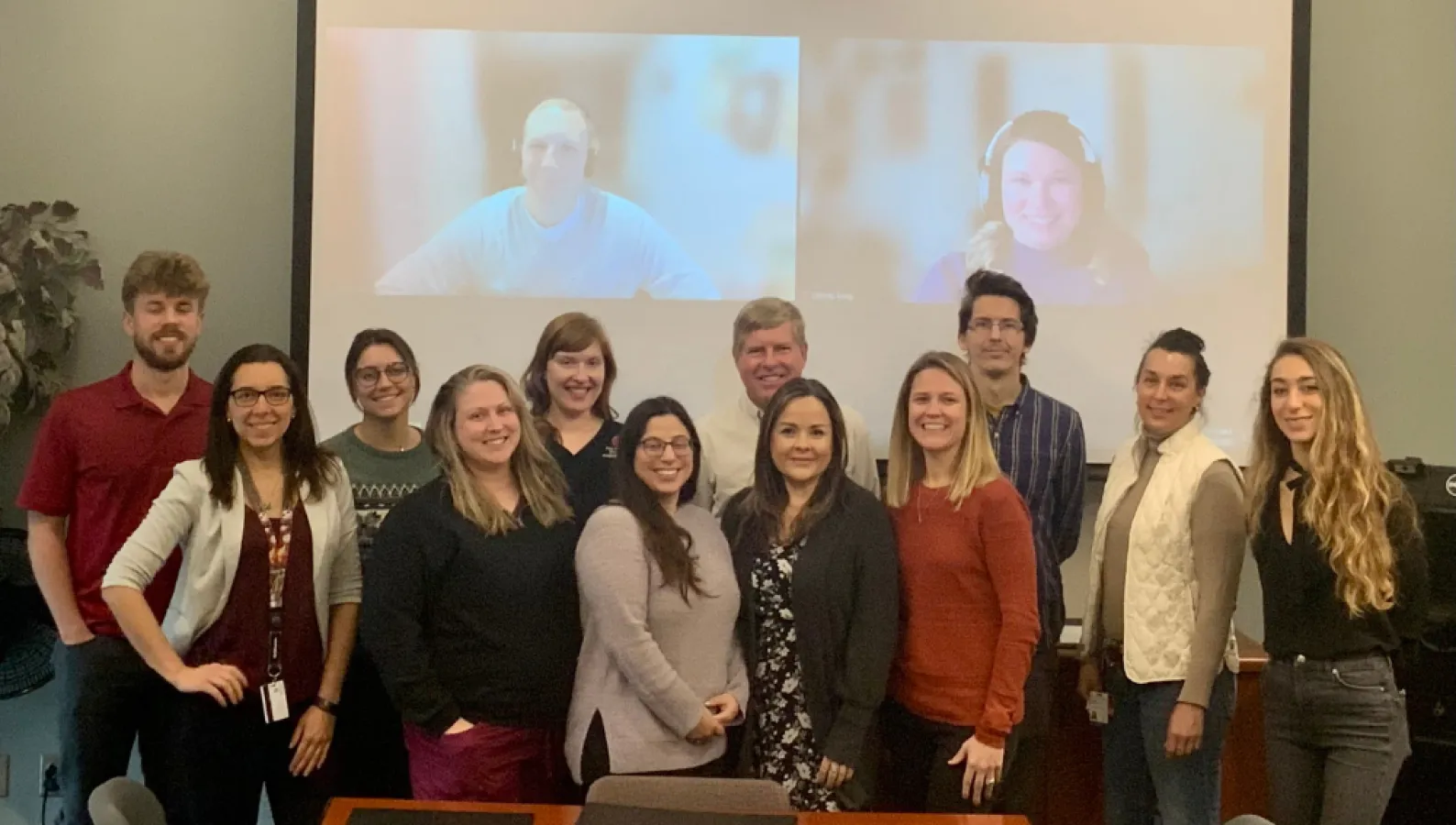Core Principles

Beginning in 2014, the Centers for Disease Control and Prevention developed core principles for ASPs to help optimize patient care and combat antimicrobial resistance. A team of veterinary clinicians, epidemiologists, pharmacists, and clinical microbiologists collaborated with human health care professionals to develop a model for ASPs in veterinary medicine.
The Ohio State University College of Veterinary Medicine Antimicrobial Stewardship Program (OSU-CVM ASP) was launched in Ohio State's Veterinary Medical Center in 2018. The OSU-CVM ASP models the CDC's core principles.
The leadership of Ohio State's College of Veterinary Medicine and Veterinary Medical Center is fully committed to supporting antimicrobial stewardship efforts. We have committed personnel, resources, and funding to implement the program at the college while we expand to private practices.
We have numerous faculty, DVMs and students responsible for our ASP. Our committed working group meets bi-weekly to ensure our ASP is working toward our goals. This working group includes epidemiologists, pharmacists, microbiologists, infection control officers, clinicians, students and technicians.
Creating antimicrobial use guidelines to help educate our students and advise clinicians on target organisms for the conditions seen in our hospital, appropriate empirical treatment options and diagnostic stewardship information.
Performing active and passive surveillance in the environment, monitoring multidrug-resistant microorganisms, tracking drug-resistant nosocomial infections and creating antibiograms.
Creating, implementing and evaluating procedures for infection prevention and control practices.
Establishing protected antimicrobial protocols to help ensure that antimicrobials targeted as protected by the CDC will be used judiciously.
Promoting infection control practices in the Veterinary Medical Center to help prevent disease spread, which would lower our use of antimicrobials.
Providing infectious disease consultations for our clinical services to help guide antimicrobial treatment and diagnostic stewardship.
Developing educational materials such as videos, factsheets, pamphlets, and training opportunities for our VMC community but also for private veterinary practices in central Ohio.
Performing novel research into various aspects of antimicrobial resistance and stewardship.
We are tracking hospital prescribing practices, susceptibility patterns (antibiograms) of patient pathogens isolated in diagnostic labs, nosocomial infections and resistance patterns of targeted surveillance isolates.
We regularly generate reports for the VMC community.
*LINK TO THEIR MOST CURRENT REPORT HERE
We create educational materials to share with our VMC community, general veterinary community and to the general public (pet owners and producers). We work with private practices to help them establish ASPs in their own clinic.
Educational Materials
The Antimicrobial Stewardship Program creates educational materials for the veterinary community, including pet owners and producers.
You can find a full list of our videos on the College of Veterinary Medicine's youtube channel here: Buckeye Antimicrobial Stewardship Program Videos
- Pet Owner Resources
- Referring Veterinarian Resources
You can find a full list of our videos on the College of Veterinary Medicine's youtube channel here: Buckeye Antimicrobial Stewardship Program Videos
- Ensuring Antibiotic Efficacy: A Guide for Food Animal Producers
- This essential video equips food animal producers with insights into the proper use, storage, and handling of antibiotics. Foster a healthy and responsible approach to antibiotic management on your farm.
- Guía para garantizar eficacia de antibióticos en producción animal
- Este vídeo esencial proporciona a los productores información básica sobre el uso, almacenamiento y manipulación adecuadas de los antibióticos. Ayúdenos a fomentar un enfoque responsable en el manejo de antibióticos en su granja.
- Navigating Best Practices: Antimicrobial Stewardship in Companion Animal Medicine
- Companion animal veterinarians, elevate your practice with this concise video. Explore key antimicrobial stewardship practices tailored to companion animal medicine, ensuring the optimal health of your furry patients.
- Guiding Principles: Antimicrobial Stewardship in Equine Medicine
- Equine veterinarians, enhance your practice with this insightful video. Dive into the specific nuances of antimicrobial stewardship in equine medicine, empowering you to make informed decisions for the well-being of your equine patients.
- Balancing Act: Antimicrobial Stewardship in Food Animal Medicine
- Food animal veterinarians, sharpen your stewardship skills with this informative video. Delve into the unique considerations of antimicrobial stewardship in food animal medicine, promoting the health and sustainability of your livestock.
- Decoding Antibiotic Decisions for pets: Why didn’t my pet receive an antibiotic
- Uncover the reasons behind why your pet might not be prescribed antibiotics in this engaging video for pet owners. We debunk common misconceptions, ensuring you understand the intricacies of appropriate antibiotic use. Stay informed, be a responsible pet parent!
- Unlocking the Facts: Antibiotic Use for Pets
- A must-watch for pet owners! Wondering what to do after your furry friend has been prescribed an antibiotic? Our short educational video is here to guide you through the right steps for responsible antibiotic use in pets. Stay informed, keep your pet healthy!
- Moments of Hand Hygiene
- 'Moments in Hand Hygiene' highlights essential practices to prevent infections. Learn when and how to perform hand hygiene effectively to ensure the health and safety of both animals and veterinary staff.
Are you a private practice looking to establish your own ASP?
BuckeyeASP is a partnership between Ohio State's College of Veterinary Medicine Antimicrobial Stewardship Program and private veterinary practices across Ohio. This program aims to promote antimicrobial stewardship, actively engaging veterinary medicine in the fight against antimicrobial resistance.

OSU-VMC Antimicrobial Use Guidelines

The Ohio State University Veterinary Medical Center Antimicrobial Use Guidelines (OSU-VMC AUG) are a compilation of evidence-based prescribing recommendations for antimicrobial drugs regularly used by OSU-VMC clinicians in each of the three hospitals within the VMC (companion animals, farm animals, and equine). The OSU-VMC AUG is designed to increase awareness of antimicrobial stewardship and to train future and current veterinarians in the prudent use of antimicrobials by providing guidance on empiric therapy.
Additional Resources
